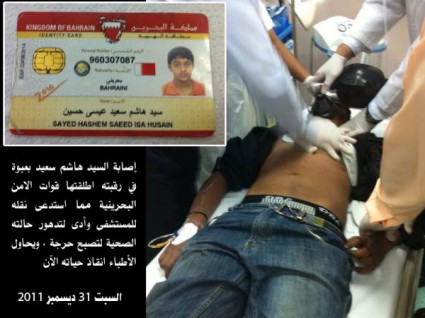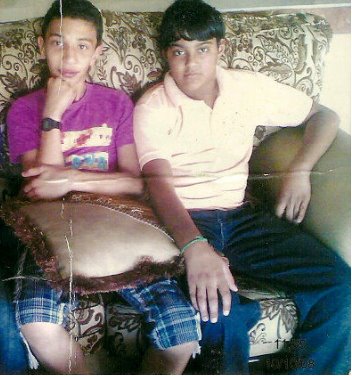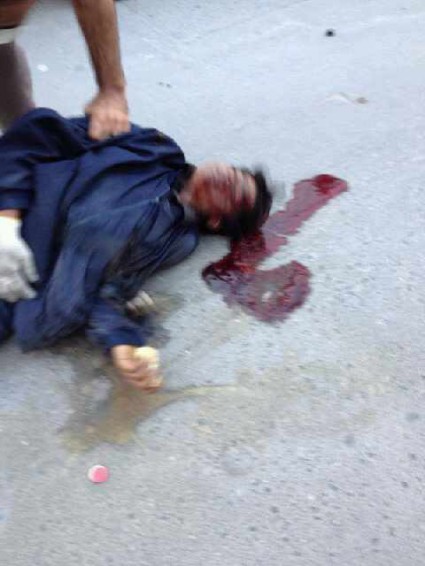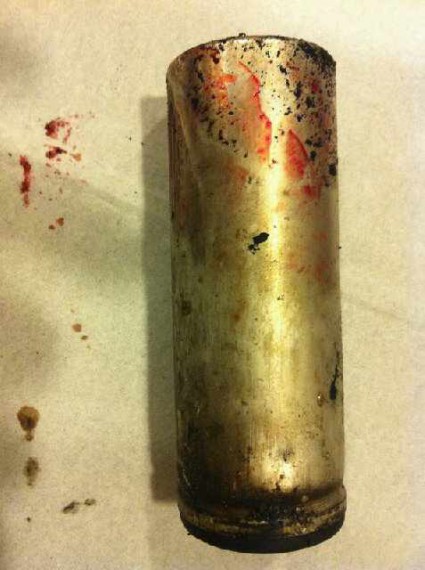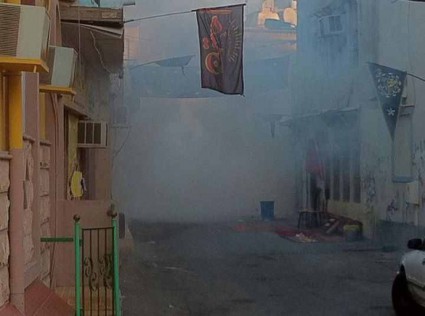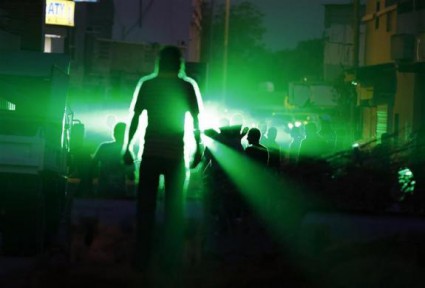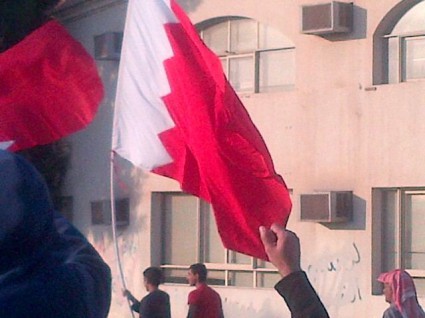Posts from — December 2011
Bahrain brings in the New Year with the murder of 15 year old by the al Khalifa regime
Urgent appeal, 15 year old Sayed Hashim Sayed Saeed killed today, areas under attack
31 December, 2011 – BCHR
On the eve of New Years, another child’s life was taken in Bahrain. 15 year old Sayed Hashim Sayed Saeed was shot with a teargas canister in the face which caused his death. Picture of Sayed Hashim with 14 year old Ali AlShaikh who was shot in the neck with a teargas canister on August 31st.
According to eyewitnesses:
Sayed Hashim was shot in the head with a teargas canister by the riot police. When 3 boys and a woman tried to save him, they were shot at with teargas, some of the teargas was shot near Sayed Hashim were he lay. Then the riot police attacked those trying to save Sayed Hashim, beating some with batons, one may have a broken arm and another has a serious injury. When one woman said “you killed him” one of the riot police shouted “shut up and don’t you dare speak of this”.
Lawyer Zahra Massoud went to the morque, she was prohibited from entering the area where Sayed Hashim’s body is being kept.
The marks of the canister where it hit Martyr Sayed Hashim near the face.
Video of when 15 year old Sayed Hashim after he was shot with a teargas canister, and at the hospital until he announced dead.
Official notification of cause of death confirm death due to bleeding caused by injury in the nick
Today we are receiving numerous reports of kidnappings, arrests and injuries in different parts of Bahrain. Several villages, as well as religious processions continue to be attacked as I write this email, in what has become the nightly routine of collective punishment.
…more
December 31, 2011 No Comments
Bahrain Security Forces murder another youth – indication systematic targeting of youth with intentional “point blank” shots to face and head
December 31, 2011 No Comments
Brave young Sayed Hashim, Murdered, 31 December, 2011 at Peaceful Protest by Bahrain Security Forces
On the eve of New Years, another child’s life was taken in Bahrain. 15 year old Sayed Hashim Sayed Saeed was shot with a teargas canister in the face which caused his death. Picture of Sayed Hashim with 14 year old Ali AlShaikh who was shot in the neck with a teargas canister on August 31st.
December 31, 2011 No Comments
15 year old, Sayed Hashim, murdered 31 December by Bahrain Security Forces
December 31, 2011 No Comments
Todays Gassing Attacks on Villages
December 31, 2011 No Comments
Village Gassed
December 31, 2011 No Comments
Wide Spread Gas and Violent Attacks on Villages Today
December 31, 2011 No Comments
Repentance and Revolution seem to share a resolve where there is no turning back
December 30, 2011 No Comments
King Hamad you have stopped nothing and what is started won’t rest until your gone!
December 30, 2011 No Comments
A Year of Crushing Voices in Bahrain
A year of blogging, threats and silence
Motivations for arresting bloggers differ between countries but the goal is always to silence “threatening” voices.
30 Dec 2011 – AlJazeera – by Jillian York
In 2009, Iranian blogger Omidreza Mirsayafi became the first blogger ever to die in prison. That year alone, a year referred to by a senior US State Department official as “the worst year in the history of the internet as it related to internet freedom”, no fewer than 35 bloggers around the world languished in prison.
While by no means a new phenomenon – Tunisia arrested its first blogger back in 2000 – the events of 2009 escalated risk for netizens across the world, as governments quickly awakened to the “threat” posed by bloggers and social media users. This year, as an increasing number of citizens have taken up cyber-arms, protesting online as well as on the street, governments have broadened their attacks on netizens. No longer content to simply censor content, countries like Syria and Bahrain have upped the ante, employing online propagandists and intimidating those who dare speak out online.
Still others – such as Thailand -utilise draconian laws to hold online publishers responsible for comments, a practice which has chilling effects for all internet users. There is no single organisation that tracks every blogger arrest around the world; indeed, doing so would be a full-time job.
Nevertheless, statistics compiled by tireless groups such as Global Voices, Reporters Without Borders and the Committee to Protect Journalists suggest 2011 to be among the worst years yet for online free expression, marred by the persecution of bloggers and social media users in a number of states. Below are five of the worst.
Bahrain
The tiny Gulf country’s blogosphere has always been lively, with a sense of openness and national pride. But in early 2011, as government crackdowns left protesters reeling and national monuments tumbling down, bloggers were amid the government’s targets. On March 30 and April 5, respectively, authorities briefly detained two of the country’s most prominent bloggers, Mahmood Al-Yousif and Mohamed El-Maskati.
And tragically, blogger Zakariya Rashid Hassan Al-Ashiri became the second blogger to die in prison, just weeks after his initial arrest. Authorities claimed his death to be a result of complications of a pre-existing condition, but photographs released by his family show evidence of serious recent abuse.
Throughout the year, the social media landscape in the country has become increasingly polarised, with some bloggers reporting the practice of self-censorship, rather than risking arrest. In July, many bloggers’ fears were reflected in the sentencing of prominent bloggers Ali Abdulemam (who was previously jailed in 2005 for insulting the regime on his site, BahrainOnline.org) and Abduljalil Alsingace to 15 years in prison. Abdulemam, who was sentenced in absentia, remains in hiding.
More recently, blogger Zainab Al-Khawaja, who tweets prolifically as @angryarabiya, was beaten and arrested after taking part in a protest. Al-Khawaja’s father, Abdulhadi Al-Khawaja, is a prominent opposition figure sentenced in June to life imprisonment. …more
December 30, 2011 No Comments
Blinding Lasers introduced in Bahrain for Crowd Control?
Anti-government protesters shout slogans while standing in front of laser beams emitted by riot police in the village of Diraz west of Manama, Bahrain December 29, 2011. Hundreds of anti-government protesters took to the streets demanding the downfall of the regime. Riot police fired tear gas to disperse and prevent demonstrators from entering the main highway. REUTERS/Hamad I Mohammed
Commonly used in combat operations, laser dazzlers have become the new threat deterrent alternative to lethal force. By employing laser light to temporarily blind the opposition, laser dazzlers are a unique and portable device that confuses and intimidates potential threats by sending a brilliant burst of laser light energy into the path of suspecting individuals. Typically a laser dazzler operates at the 532nm wavelength (green spectrum) and has an output rating between 50mW and 400mW.
These devices can be hand held or weapon mountable for versatility, convenience and ease of use. Some laser dazzlers have adjustable focus and can essentially flood a target with blinding light. Using a broader beam allows a larger swath path and less precision is needed to effectively produce a tactical advantage. Tighter beams allow longer range and increases maximum effectiveness at longer distances. Laser Dazzlers, dazzle the enemy with blinding light which disorientates and confuses combatants. excerpted from advert HERE
December 30, 2011 No Comments
Ministry of Human Rights lauches children “help line” so kids can call when Security Forces are gassing them to death
Helpline for
children
launched
in Bahrain
29 December 2011 – Khaleej Times
MANAMA – A new 998 Child Helpline for children was launched in the Children Protection Centre on Tuesday.
The 998 helpline operates in conformity with the strategy of the 109 International Child Helpline all over the world. The 998 Child Helpline operates under the supervision of various government ministries and civil society organisations.
This is the first toll-free helpline to provide direction and guidance to children as well as appropriate options to solve their problems. It helps to uphold children’s rights emanating from the principle of children’s right to survival, building and developing.
Minister of Human Rights and Social Development Dr Fatima Mohammed Al Balushi said that the helpline receives calls from children in distress or whenever there is an imminent danger. The helpline also receives calls from anyone seeking direct intervention and specialist psychiatric guidance, referral, active listening and various other services as per latest scientific studies and recommendations for direct contact between children and intermediaries to prevent the break-up of family. External coaches shall be absorbed for training instructors and social workers in the Children Protection Centre.
The direct helpline adopts various strategies in order to spread awareness including the media.
The minister explained that the helpline breaks the communication gap between the family and the community and boosts children’s rights and builds practical methodology focused on children. It also focuses on a child’s needs and rights in an attempt to see the world through a child’s point of view and work with the child and encourage him/her for participation.
Efforts are also being made to use the points of strength and empower the child to take decisions on their own. …source
December 30, 2011 No Comments
Meqsha – time go King Hamad, theres a new Bahrain on the Horizon!
December 30, 2011 No Comments
State Department’s April assessment of Saudi Human Rights Abuse unreported in the West paves the way for Obama’s Reckless Weapons dealing
Saudi Arabian State Terror
| Print | E-mail
Friday, 30 December 2011 11:22
By Stephen Lendman
Share Link: Share Link: Bookmark Google Yahoo MyWeb Del.icio.us Digg Facebook Myspace Reddit Ma.gnolia Technorati Stumble Upon Newsvine
Comments and Reactions
saudi-womenAnnually, the State Department publishes human rights reports for over 190 countries. Its latest April 8, 2011 Saudi Arabia assessment discusses “significant human rights abuses and the inability of citizens to change its absolute monarchal rule.
Abuses include:
– torture and physical abuse
– poor prison and detention center conditions
– arbitrary arrest and incommunicado detention
– denial of fair and public trials and lack of due process in the judicial system
– political prisoners
– restrictions on civil liberties such as freedom of speech (including the Internet)
– assembly, association, movement, and severe restrictions on religious freedom
– corruption and lack of transparency.”
Also mentioned were inequality and violence against women, human trafficking, no labor rights, discrimination on the basis of gender, religion, sect and ethnicity, and violations of children’s rights.
Saudi’s absolute monarchal rule is despotic, lawless and brutal. It’s a police state practicing state terrorism internally and regionally. It’s also Washington’s main Middle East ally after Israel.
In early December, Amnesty International (AI) published a report on the kingdom titled, “Saudi Arabia: Repression in the Name of Security.”
Largely unnoticed in the West like the State Department’s April assessment, major media scoundrels suppressed its ugly findings.
AI quoted Khaled al-Johani addressing reporters in Riyadh on the March 11, 2011 “Day of Rage,” saying:
“I am here to say we need democracy. We need freedom. We need to speak freely. We need no one to stop us from expressing our opinions.”
Shortly afterward he was arrested and charged with “communicating with the foreign media.” He’s now held incommunicado in Saudi’s notoriously repressive prison system.
On March 5, Press TV reported the arrest and detention of senior Saudi cleric Sheikh Tawfiq al-Amer. At issue was his call for constitutional monarchal rule. …more
December 30, 2011 No Comments
Saudi Arabia is not immune to the Arab Spring
Saudi Arabia is not immune to the Arab Spring. The basic human right to protest peacefully is all the more important in a place like Saudi Arabia, where there are almost no other means of participating in public affairs. Christoph Wilcke, Senior Middle East Researcher at Human Rights Watch
Saudi Arabia: Renewed Protests Defy Ban Release Imprisoned Advocates of Peaceful Reform
30 December, 2011 – HRW
Saudi Arabia is not immune to the Arab Spring. The basic human right to protest peacefully is all the more important in a place like Saudi Arabia, where there are almost no other means of participating in public affairs.
Christoph Wilcke, Senior Middle East Researcher at Human Rights Watch
(Beirut) – Saudi reform advocates have staged several protests since mid-December, 2011, despite a categorical ban on protests issued last March, Human Rights Watch said today. In Riyadh, Buraida, and Qatif, security forces immediately arrested the protesters, who were peacefully protesting the detention without trial of hundreds of people held for long periods in intelligence prisons.
Saudi Arabia’s Interior Ministry should immediately release scores of detained and convicted peaceful advocates of reform, Human Rights Watch said.
“Saudi Arabia is not immune to the Arab Spring,” said Christoph Wilcke, senior Middle East researcher at Human Rights Watch. “The basic human right to protest peacefully is all the more important in a place like Saudi Arabia, where there are almost no other means of participating in public affairs.”
Since the Arab protest movements began in January, hundreds of Saudis have voiced specific grievances or called for political reform. The Saudi government banned all public protests on March 5, after public protests in the capital, Riyadh, and in Qatif in the Eastern Province. However, the Qatif protests have continued and Riyadh protests began again in mid-December.
On December 23, Saudi security forces arrested about 30 women and 30 men who participated in a silent protest in Riyadh, a participant told Human Rights Watch. The protesters called in particular for the release of Dr. Yusuf al-Ahmad, a controversial cleric arrested in July after he tweeted support for the relatives of long-term detainees. By December 28, all but four or five of those arrested had been released. …more
December 30, 2011 No Comments
Call for Saudi Arabia to Free Jailed Reformists
Call for Saudi Arabia to Free Jailed Reformists
CAIRO December 30, 2011 (AP)
Human Rights Watch is calling on Saudi authorities to release scores of political reform advocates jailed in the conservative Muslim kingdom.
Saudi Arabia has not seen unrest on the scale of other nations roiled by the Arab Spring. But some demonstrations have taken place, particularly in areas home to the Shiite Muslim minority that has complained for decades about a lack of rights.
The government banned all public protests in March.
The rights group says authorities arrested 60 men and women who took part in a silent protest in the capital, Riyadh, on Dec. 23. They were protesting the jailing of cleric Yusuf al-Ahmad, who was arrested in July after expressing support for families of detainees. …source
December 30, 2011 No Comments
Saudi Schools teach Human Rights Abuse
Saudi new textbooks teach children to cut off hand and feet
by Donell McGriff – 29 December, 2011 – Metro Zimbabwe
Zimmetro — The world continues to be spooked by what Saudi Arabia dispersed to its children throughout the national curriculum. After the Sept. 11 terrorist attacks, there was an intense focus on Saudi Arabia and its educational teachings because almost all of the attackers were from the kingdom. Observers found widespread controversial, hate-incited and inflammatory languages in Saudi school textbooks, and pressed the issues to the helm of Western governments.
In 2006, Saudi Ambassador to the U.S. Prince Turki al-Faisal told the Chicago Council on Foreign Relationships that the Saudi king was determined to eradicate this ideology of hate. His statement last time:
“In Saudi Arabia, King Abdullah recognizes that above all else education is the key, and he has put forth a program of reforms in this area,” al-Faisal said. “In recent years, the kingdom has reviewed all of its education practices and materials and has removed any element that is inconsistent with the needs of a modern education. Not only have we eliminated what is objectionable from old textbooks that were in our system, we have also implemented a comprehensive internal revision and modernization plan. “
Now observers returned to the ‘revised’ 2010-2011 Saudi school textbooks, and found something which are still rather unpleasant for them.
Riyadh, Saudi Arabia – Despite Saudi Arabia’s promises to clean up textbooks in the kingdom, recent editions continue to raise alarms in the West over jihadist language.
Recently, the Institute for Gulf Affairs (IGA) in Washington, D.C., was able to get its hands on some Saudi textbooks. The group then provided these startling translations to Fox News. According to Alu Al-Ahmen, director of the IGA, terrorism starts in the education system. “If you teach six million children such knowledge in these important learning years of their lives, if you install all those in their brain, it is of no wonder we have so many Saudi suicide bombers,” he explains.
Al-Ahmen, a Saudi citizen, said his organization obtained the textbooks from confidential sources within the kingdom, and brought them out from the kingdom to the U.S. He added that the texts are paid for by the Saudi government. The government’s role in the funding of the textbooks makes the presence of controversial and dangerous language even more concerning.
Saudi textbooks brought to the U.S. for observation, some of them intended for the whole Muslim whole as shown in the map.
In a textbook for 10th-graders, printed for the 2010-2011 academic year, al-Ahmed said teenagers are taught barbaric practices. “They show students how to cut (the) hand and the feet of a thief,” he said. In another textbook, for ninth-graders, the students are taught the annihilation of the Jewish people is imperative and necessary. One text reads in part: “The hour (of judgment) will not come until the Muslims fight the Jews and kill them. The Jew will hide behind the stone and the tree, and the stone or tree will say: Oh Muslim, there is a Jew behind me, come and kill him.” …more
December 30, 2011 No Comments
Oil drops below $100 as Saudis say they will offset Iran oil blockade, US Navy warns Iran
Oil drops below $100 as Saudis say they will offset Iran oil blockade, US Navy warns Iran
By Associated Press, December 27, 2011
NEW YORK — Oil prices fell on Wednesday, after Saudi Arabia said it will offset any loss of oil from a threatened Iranian blockade of a crucial tanker route in the Middle East.
The U.S. Navy warned that any disruption of traffic through the vital Strait of Hormuz “will not be tolerated.”
On Tuesday Iran’s vice president said that his country was ready to close the Strait of Hormuz — a vital waterway through which a third of the world’s tanker traffic flows — if western nations embargo the country’s oil because of Iran’s ongoing nuclear program. The head of the country’s navy added on Wednesday that his fleet can block the strait if need be. His comments came as Iran held a 10-day drill in international waters near the strategic route, which is 21 miles wide at its narrowest point.
A Saudi oil ministry official told The Associated Press that Saudi Arabia and other Gulf producers are ready to provide more oil if Iran tries to block the strait. The official spoke on condition of anonymity because he was not authorized to discuss the issue. He didn’t specify other routes that could be used to transport oil, although they would likely be longer and more expensive for getting crude to the region’s customers.
“Anyone who threatens to disrupt freedom of navigation in an international strait is clearly outside the community of nations; any disruption will not be tolerated,” said Lt. Rebecca Rebarich, a spokeswoman for the U.S. Navy’s Fifth Fleet, which is responsible for naval operations in the Persian Gulf, the Red Sea and the Arabian Sea.
Some analysts think the Iranian threats are more rhetoric than reality. “We doubt political posturing will turn into action,” energy consultant and trader Stephen Schork said in a report.
“Shutting down the strait … is the last bullet that Iran has and therefore we have to express some doubt that they would do this and at the same time lose their support from China and Russia,” said analyst Olivier Jakob of Petromatrix in Switzerland.
Iran is the fourth largest oil exporter in the world, according to the Energy Department. Most of its crude goes to Asia, with China its biggest customer. Oil provides half of Iran’s revenue. Last year that amounted to about $73 billion.
In New York benchmark crude fell $1.98 to finish at $99.36 a barrel. Brent crude fell $1.71 to end at $107.56 a barrel in London.
Oil prices were also undercut on Wednesday by persistent worries about Europe and future demand for oil as the region’s economy weakens. The European Central Bank said the continent’s banks parked a record $590.72 billion overnight with the ECB, reflecting distrust in the European banking system. …more
December 30, 2011 No Comments
Saudi Arabian State Terror
Saudi Arabian State Terror
by Stephen Lendman – 30 December, 2011 – Indy
Annually, the State Department publishes human rights reports for over 190 countries. Its latest April 8, 2011 Saudi Arabia assessment discusses “significant human rights abuses and the inability of citizens to change its absolute monarchal rule. Abuses include:
• “torture and physical abuse;
• poor prison and detention center conditions;
• arbitrary arrest and incommunicado detention;
• denial of fair and public trials and lack of due process in the judicial system;
• political prisoners;
• restrictions on civil liberties such as freedom of speech (including the Internet);
• assembly, association, movement, and severe restrictions on religious freedom; and
• corruption and lack of transparency.”
Also mentioned were inequality and violence against women, human trafficking, no labor rights, discrimination on the basis of gender, religion, sect and ethnicity, and violations of children’s rights.
Saudi’s absolute monarchal rule is despotic, lawless and brutal. It’s a police state practicing state terrorism internally and regionally. It’s also Washington’s main Middle East ally after Israel.
In early December, Amnesty International (AI) published a report on the kingdom titled, “Saudi Arabia: Repression in the Name of Security.”
Largely unnoticed in the West like the State Department’s April assessment, major media scoundrels suppressed its ugly findings.
AI quoted Khaled al-Johani addressing reporters in Riyadh on the March 11, 2011 “Day of Rage,” saying:
“I am here to say we need democracy. We need freedom. We need to speak freely. We need no one to stop us from expressing our opinions.”
Shortly afterward he was arrested and charged with “communicating with the foreign media.” He’s now held incommunicado in Saudi’s notoriously repressive prison system.
On March 5, Press TV reported the arrest and detention of senior Saudi cleric Sheikh Tawfiq al-Amer. At issue was his call for constitutional monarchal rule.
On March 23, Press TV reported 100 Shia protesters arrested after participating in anti-government demonstrations for political reforms and immediate political prisoner releases.
More recently on December 5, Press TV reported large anti-government protests in Saudi Arabia’s oil-rich Eastern Province and another one on December 9 in Awamiyah, an Eastern Persian Gulf village.
Last April, Saudi’s Interior Ministry said 5,831 people were arrested for being associated with a “deviant group,” allegedly Al Qaeda. About 600 were sentenced. Another 600 awaited trials. Unsubstantiated terrorist related charges assures long, repressive prison terms.
A more recent high-profile case involved 16 men, including nine prominent reformists. They were sentenced to up to 30 years for allegedly trying to seize power by financing terrorism with laundered money. Their charges and trial had no legitimacy whatever. They were victimized for advocating political change and human rights.
[Read more →]
December 30, 2011 No Comments
NPWJ condemns security forces raids on human rights defenders in Egypt
NPWJ condemns security forces raids on human rights defenders in Egypt
Brussels-Rome, 30 December 2011
On 29 December 2011, Egyptian prosecutors and police raided the offices of 17 local and international pro-democracy and human rights NGOs, temporarily detaining employees and searching computer files, as part of an investigation vowed by the Supreme Council of the Armed Forces (SCAF) into foreign funding of such groups in violation of Egyptian laws.
Among groups targeted were the local offices of the U.S.-based International Republican Institute (IRI), National Democratic Institute (NDI) and Freedom House, as well as the German-based Konrad Adenauer Foundation.
Statement by Niccoló Figa-Talamanca, Secretary-General of No Peace Without Justice:
“No Peace Without Justice (NPWJ) and the Nonviolent Radical Party, Transnational and Transparty (NRPTT) call on the Egyptian political and judicial authorities to end immediately the campaign of harassment, intimidation and restrictions against human rights defenders. These recent actions are in violation of Egypt’s international commitments under Article 19 of the Universal Declaration for Human Rights and the International Covenant on Civil and Political Rights.
“The crackdown on human rights organisations whose purpose is to support the transition of Egypt toward an open and democratic State is a major setback and recalls similar campaigns carried out during the previous dictatorial regime. By curtailing fundamental human rights, such as freedom of association, the Egyptian interim authorities are blatantly contradicting the impetus of the revolution. Far from laying the groundwork for a future based on democratic values, the rule of law and the promotion and protection of human rights, they are instead looking down the same path as the previous regime.
“Since the revolution began, civil society – restricted almost out of existence under the previous regime, unless they were linked to the government – has flourished. Civil society groups are proving to be a driving force in this transitional process, by mobilising people and promoting their participation in public life, which is a critical part of empowering people to understand and embrace democracy.
“It is only by fully accepting and championing the values and principles of democracy and supporting those brave men and woman who, in the name of those same principles faced Mubarak’s torturers and carried out the Spring Revolution, that the Egyptian interim authorities can keep the flame of the Revolution alight and ensure that liberal institutions and democracy thrive as the home-grown aspirations they are”. …source
December 30, 2011 No Comments
Obama’s jobs for torture and blood program
U.S. touts Saudi Arabia fighter jet deal as a foreign policy, security and economic boon
By Joby Warrick and Jason Ukman, 29 December, 2011 – Washington Post
The Obama administration on Thursday hailed a new $30 billion arms deal with Saudi Arabia as both a hedge against Iranian aggression in the Persian Gulf and an economic windfall that could create thousands of U.S. jobs over the next decade.
The agreement to sell 84 top-of-the line F-15SA fighter jets to the Saudi air force also provided a needed boost to U.S. relations with the oil-rich kingdom after months of strain over the White House’s response to the Arab Spring uprisings, U.S. officials and Middle East analysts said.
The deal, which was finalized after more than a year of negotiations, was announced during a week of increased tensions with Iran, which has renewed its threat to block ship traffic through the Strait of Hormuz in response to international economic sanctions. The administration has pursued a policy of supplying advanced weapons systems to friendly Arab states to keep Iran’s regional ambitions in check.
“This sale will send a strong message to countries in the region that the United States is committed to stability in the gulf and broader Middle East,” Andrew Shapiro, assistant secretary of state for political-military affairs, told reporters.
The deal — outlines of which were disclosed to Congress last year — also calls for refurbishing 70 F-15s currently in Saudi Arabia’s fighter fleet, as well as providing munitions, spare parts and training for Saudi pilots and air crews.
The deal comes at a time when the Pentagon is considering supplying “bunker-buster” bombs and other munitions to another key gulf ally, the United Arab Emirates.
U.S. officials said the timing of the announcement was unrelated to Iran’s recent provocations.
“Clearly, one of the threats that [the Saudis] — that they face, as well as other countries in the region — is Iran,” Shapiro said. “But . . . this is not solely directed toward Iran. This is directed toward meeting our partner Saudi Arabia’s defense needs.”
While not the newest U.S. fighter jet, the model of the F-15 being acquired by Saudi Arabia will be equipped with the latest computers, radars and electronic warfare systems and will be “one of the most capable aircraft in the world,” said James Miller, the Defense Department’s principal deputy undersecretary for policy.
U.S. officials also touted the deal’s impact at home, saying the production of the Boeing-built F-15s would support 50,000 American jobs.
“It will engage 600 suppliers in 44 states and provide $3.5 billion in annual economic impact to the U.S. economy,” Shapiro said. “This will support jobs not only in the aerospace sector but also in our manufacturing base and support chain, which are all crucial for sustaining our national defense.”
Saudi Arabia, which has a predominantly Sunni Muslim population, is the key regional rival to Shiite-dominated Iran, as well as a vital U.S. ally.
The Obama administration has sought to smooth relations with Riyadh after months of strain over U.S. support for democratic uprisings in the Middle East. Saudi leaders were particularly angered when the White House criticized the crackdown on a Shiite-led movement in the neighboring kingdom of Bahrain. …more
December 30, 2011 No Comments
Time Magazine: Bahrain one of the Ten Unreported Stories of 2011 – Surprise!
Bahrain: The Frozen Arab Spring
By Nate Rawlings – Dec. 07, 2011 – Time
Throughout the Middle East, 2011 was a year of revolution and uprising as the Arab Spring pushed from Tunisia to Egypt, Yemen and Libya to Syria. But when it reached the Gulf, the forces of freedom and democracy faced an aggressive push-back from the oil-rich monarchs. Nowhere was the backlash more brutal than in the tiny Kingdom of Bahrain, whose Shi’ite majority came out in protest to demand greater freedom and equality from the island’s ruling Sunni royal family. They were answered by a violent crackdown orchestrated by neighboring Saudi Arabia, which blamed Iran for stoking the protests and sent troops to help clear the streets of Manama. The crackdown led to an estimated 36 deaths and more than 500 injuries, as well as numerous accounts of torture — confirmed by the report of Bahrain’s official Independent Commission of Inquiry, which also found no evidence to back the claim that Iran was behind the protests. But the Bahrain crackdown got far less media attention than the dramatic events elsewhere. For one thing, the Qatari news channel Al-Jazeera, which had been the media mainstay of the Arab Spring, showed a lot less enthusiasm for covering the turmoil in the fellow monarchy next door. …source
December 30, 2011 No Comments
Banks World wide getting ready for Euro collapse
Banks World wide getting ready for Euro collapse
25 December, 2011 – Jafria News
JNN 24 Dec 2011 : Banks around the world are preparing for the possible collapse of the euro as fears of the European debt crisis increase.
Several banks are even installing systems capable of coping with trading in old European currencies.
Meanwhile finance firms, corporations, and different governments have also turned to plans that aim at preparing them for harsh times.
Regulators have asked banks in the US and UK to provide updates on readiness levels in case of a possible euro collapse.
Some corporate firms have also started transferring their cash on a daily basis out of European countries, including debt-ridden Greece instead of once every two weeks.
Europe has for months grappled with an economic and financial crisis. Insolvency now threatens in-debt countries such as Greece, Portugal, Italy, Ireland and Spain.
Since its formation, the European Union had been a haven for those seeking refuge from war, persecution and poverty in other parts of the world.
The worsening debt crisis, however, has forced European governments to adopt harsh austerity measures and tough economic reforms. Tens of thousands of Europeans are migrating from their homelands as a result of these difficulties.
There are fears that more delays in resolving the eurozone debt crisis could push not only Europe, but also much of the rest of the Western world back into recession. …source
December 29, 2011 No Comments
US Prepares to deliver weapons to Country that Sentences Six to Lose Hands, Feet in unfair trials
After Unfair Trials, Saudi Arabia Court Sentences Six to Lose Hands, Feet
December 16, 2011 – HRW – Christoph Wilcke
Cutting off someone’s hands and feet is torture, plain and simple. Judicially sanctioned torture is abhorrent, and this verdict, if confirmed, would bespeak a state policy of torture.
(Beirut) – The Supreme Court of Saudi Arabia should void a sentence to amputate the hands and feet of six stateless people convicted of armed robbery, Human Rights Watch said today in a letter to the Saudi Human Rights Commission. The sentence constitutes internationally prohibited torture.
Human Rights Watch urged the Saudi Human Rights Commission to press for a retrial and a voiding of the sentence.
“Cutting off someone’s hands and feet is torture, plain and simple,” said Christoph Wilcke, senior Middle East researcher at Human Rights Watch. “Judicially sanctioned torture is abhorrent, and this verdict, if confirmed, would bespeak a state policy of torture.” The family of ‘Amir ‘Iyada, one of those convicted, learned in early December, 2011, that the Court of Cassation had confirmed the verdict of amputation issued by Riyadh’s General Court in January. The Supreme Court, which has not yet reviewed the case, provides the final judicial review. Under Saudi law, the king may not grant a pardon to cases of hiraba, or armed robbery, considered a crime against God under Saudi interpretation of Sharia law.
Judge Abd al-‘Aziz Al al-Shaikh of Riyadh’s General Court tried ‘Iyada and his co-defendants in only two court sessions, each lasting less than one hour, and prohibited them from appointing lawyers to assist them in their defense, ‘Iyada told Human Rights Watch. ‘Iyada’s family-appointed lawyer prepared his written appeal, but was not allowed to meet with his client, attend court sessions, or see documents except for the public verdict. …more
December 29, 2011 No Comments
US escalates war tensions to ensure weapons deal to Saudi Fascists – Alcoa to reap profits from Aluminium Sales
U.S., Saudi Sign Boeing F-15 Fighter Deal Proposed in 2010
December 29, 2011 – Hans Nichols, Steven Komarow, Ann Hughey – Bloomberg
Dec. 29 (Bloomberg) — The Obama administration has signed an agreement with Saudi Arabia that Congress approved in 2010 to sell Boeing Co. F-15 fighters to the Gulf ally.
“Valued at $29.4 billion, this agreement includes production of 84 new aircraft and the modernization of 70 existing aircraft as well as munitions, spare parts, training, maintenance and logistics,” the White House’s principal deputy press secretary, Josh Earnest, said in an e-mailed statement. The jets “are among the most sophisticated and capable aircraft in the world,” he said.
The sale, signed on Christmas Eve in Riyadh, “will send a strong message to countries in the region that the United States is committed to security in the Gulf,” said Andrew Shapiro, assistant secretary of state for political-military affairs, at a State Department briefing announcing the deal’s completion.
The announcement came after Iran threatened to block the Strait of Hormuz, a major shipping channel for Persian Gulf oil, if economic sanctions are increased. The sanctions are aimed at stopping the Islamic Republic from acquiring a nuclear bomb. …more
December 29, 2011 No Comments

